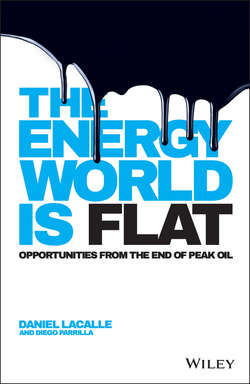Читать книгу The Energy World is Flat - Lacalle Daniel - Страница 10
На сайте Литреса книга снята с продажи.
Chapter One
The Mother of All Battles. The Flattening and Globalization of the Energy World
Geopolitics and high crude oil prices
ОглавлениеThe oil embargo in 1973 had taken everyone by surprise, changed the energy world forever, and shaped international politics and economics.
Energy security became a top strategic priority for governments around the world, who were using any tool at their disposal to reduce their dependency on Middle East oil.
The high prices of the 1970s displaced crude oil from power generation and industrial uses in favour of coal, natural gas, nuclear, and other alternatives.
But crude oil managed to maintain its monopoly over the transportation sector. Gasoline, diesel, and jet fuel are all derived from crude oil and have so far faced limited competition from other fuels such as natural gas and electric cars.
Consumers have tried to find cheaper and more reliable alternatives, but until recently they have not been available on a large and commercial scale. But things are changing, and quickly.
In the meantime, geopolitics has remained a major source of volatility and uncertainty, giving consumers an incentive to find alternative solutions.
In 2011, around the same time as the Fukushima disaster was changing the nuclear and natural gas markets, North Africa was involved in a geopolitical tsunami that would become known as “the Arab Spring”.
The events that started in Tunisia quickly spread across the region – Egypt, Libya, Syria, Bahrain, Algeria – in what seemed like an unstoppable geopolitical domino that would eventually reach the core of the Middle East.
I was supposed to fly to Riyadh in Saudi Arabia around those dates. During my career in the oil industry I have travelled to many live conflict areas – Sierra Leone, Nigeria, Colombia, Venezuela, and Jordan – and from the airport to the hotel to the meeting to the hotel and back to the airport,I have always been accompanied by bodyguards and a convoy of armoured cars. Sometimes it felt a bit excessive, but time would prove them right. During those trips I had numerous scares. Perhaps the worst one happened at the Sheraton in Ikeja, Nigeria, when we were woken in the middle of the night by gunfire as a mob was trying to assault the premises. Luckily the situation was kept under control, yet, as scary as it was, we had our morning meetings at the hotel the day after as if nothing had happened. However, this time, for some reason, it felt different.
The developments in North Africa sent crude oil prices sky-rocketing in response to both actual and potential supply disruptions.
But the consumer world was better prepared this time and started to trigger its defence mechanisms. The US Energy Information Administration (EIA) coordinated the release of 60 million barrels from its global strategic petroleum reserves, helping to calm and stabilize the nervous markets.
Luckily the situation was contained, and the largest producers such as Saudi Arabia were not impacted, and despite the ongoing disruptions in North Africa, prices moved to what felt like an unstable equilibrium at high but moderate prices.
What is important to note is that events that perhaps create the perception that the energy world is not flat, such as geopolitics, supply concentration, and the dependence on oil, are actually strong flattening forces that destroy those imbalances.
How? Well, for every geopolitical event and every issue of security, consumers have always reacted by building buffers and making contingencies, from storage, to demand destruction, to new discoveries, to developing new technologies.
In 2014, despite the ongoing supply disruptions from Libya, oil sanctions in Iran, ongoing conflicts and disruptions from Sudan and Syria, and a drastic reduction in Iraq volumes, the price of crude oil had a very moderate response.
Yes, geopolitics can result in higher prices in the short term, but invariably result in lower prices in the longer term. The net result: a flatter energy world.
